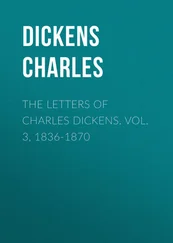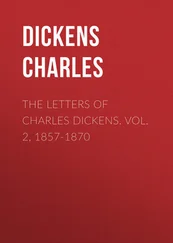Генри Джеймс - The Letters of Henry James. Vol. II
Здесь есть возможность читать онлайн «Генри Джеймс - The Letters of Henry James. Vol. II» — ознакомительный отрывок электронной книги совершенно бесплатно, а после прочтения отрывка купить полную версию. В некоторых случаях можно слушать аудио, скачать через торрент в формате fb2 и присутствует краткое содержание. Жанр: Биографии и Мемуары, foreign_antique, foreign_prose, на английском языке. Описание произведения, (предисловие) а так же отзывы посетителей доступны на портале библиотеки ЛибКат.
- Название:The Letters of Henry James. Vol. II
- Автор:
- Жанр:
- Год:неизвестен
- ISBN:нет данных
- Рейтинг книги:4 / 5. Голосов: 1
-
Избранное:Добавить в избранное
- Отзывы:
-
Ваша оценка:
- 80
- 1
- 2
- 3
- 4
- 5
The Letters of Henry James. Vol. II: краткое содержание, описание и аннотация
Предлагаем к чтению аннотацию, описание, краткое содержание или предисловие (зависит от того, что написал сам автор книги «The Letters of Henry James. Vol. II»). Если вы не нашли необходимую информацию о книге — напишите в комментариях, мы постараемся отыскать её.
The Letters of Henry James. Vol. II — читать онлайн ознакомительный отрывок
Ниже представлен текст книги, разбитый по страницам. Система сохранения места последней прочитанной страницы, позволяет с удобством читать онлайн бесплатно книгу «The Letters of Henry James. Vol. II», без необходимости каждый раз заново искать на чём Вы остановились. Поставьте закладку, и сможете в любой момент перейти на страницу, на которой закончили чтение.
Интервал:
Закладка:
To William James
Dictated.
95 Irving Street, Cambridge, Mass. July 2nd, 1905.Dearest W.,
I am ticking this out at you for reasons of convenience that will be even greater for yourself, I think, than for me.... Your good letter of farewell reached me at Lenox, from which I returned but last evening—to learn, however, from A., every circumstance of your departure and of your condition, as known up to date. The grim grey Chicago will now be your daily medium, but will put forth for you, I trust, every such flower of amenity as it is capable of growing. May you not regret, at any point, having gone so far to meet its queer appetites. Alice tells me that you are to go almost straight thence (though with a little interval here, as I sympathetically understand) to the Adirondacks: where I hope for you as big a bath of impersonal Nature as possible, with the tub as little tainted, that is, by the soapsuds of personal : in other words, all the "board" you need, but no boarders. I seem greatly to mislike, not to say deeply to mistrust, the Adirondack boarder....I greatly enjoyed the whole Lenox countryside, seeing it as I did by the aid of the Whartons' big strong commodious new motor, which has fairly converted me to the sense of all the thing may do for one and one may get from it. The potent way it deals with a country large enough for it not to rudoyer , but to rope in, in big free hauls, a huge netful of impressions at once—this came home to me beautifully, convincing me that if I were rich I shouldn't hesitate to take up with it. A great transformer of life and of the future! All that country charmed me; we spent the night at Ashfield and motored back the next day, after a morning there, by an easy circuit of 80 miles between luncheon and a late dinner; a circuit easily and comfortably prolonged for the sake of good roads....But I mustn't rattle on. I have still innumerable last things to do. But the portents are all propitious— absit any ill consequence of this fatuity! I am living, at Alice's instance, mainly on huge watermelon, dug out in spadefuls, yet light to carry. But good bye now. Your last hints for the "Speech" are much to the point, and I will try even thus late to stick them in. May every comfort attend you!
Ever yours, HENRY JAMES.To Miss Margaret James
The project of a book on London was never carried further, though certain pages of the autobiographical fragment, The Middle Years , written in 1914-15, no doubt shew the kind of line it would have taken.
Lamb House, Rye. November 3rd, 1905.Dearest Peg,
In writing to your father (which, however, I shall not be able to do by this same post) I will tell him a little better what has been happening to me and why I have been so unsociable. This unsociability is in truth all that has been happening—as it has been the reverse of the medal, so to speak, of the great arrears and urgent applications (to work) that awaited me here after I parted with you. I have been working in one way and another with great assiduity, squeezing out my American Book with all desirable deliberation, and yet in a kind of panting dread of the matter of it all melting and fading from me before I have worked it off. It does melt and fade, over here, in the strangest way—and yet I did, I think, while with you, so successfully cultivate the impression and the saturation that even my bare residuum won't be quite a vain thing. I really find in fact that I have more impressions than I know what to do with; so that, evidently, at the rate I am going, I shall have pegged out two distinct volumes instead of one. I have already produced almost the substance of one—which I have been sending to "Harper" and the N.A.R., as per contract; though publication doesn't begin, apparently, in those periodicals till next month. And then (please mention to your Dad) all the time I haven't been doing the American Book, I have been revising with extreme minuteness three or four of my early works for the Edition Définitive (the settlement of some of the details of which seems to be hanging fire a little between my "agent" and my New York publishers; not, however, in a manner to indicate, I think, a real hitch.) Please, however, say nothing whatever, any of you to any one, about the existence of any such plan. These things should be spoken of only when they are in full feather. That for your Dad—I mean the information as well as the warning, in particular; on whom, you see, I am shamelessly working off, after all, a good deal of my letter. Mention to him also that still other tracts of my time, these last silent weeks, have gone, have had to go, toward preparing for a job that I think I mentioned to him while with you—my pledge, already a couple of years old to do a romantical-psychological-pictorial "social" London (of the general form, length, pitch, and "type" of Marion Crawford's Ave Roma Immortalis ) for the Macmillans; and I have been feeling so nervous of late about the way America has crowded me off it, that I have had, for assuagement of my nerves, to begin, with piety and prayer, some of the very considerable reading the task will require of me. All this to show you that I haven't been wantonly uncommunicative. But good-night, dear Peg; I am going to do another for Aleck. With copious embraces,
HENRY JAMES.To H. G. Wells
My dear Wells,
If I take up time and space with telling you why I have not sooner written to thank you for your magnificent bounty, I shall have, properly, to steal it from my letter, my letter itself; a much more important matter. And yet I must say, in three words, that my course has been inevitable and natural. I found your first munificence here on returning from upwards of 11 months in America, toward the end of July—returning to the mountain of arrears produced by almost a year's absence and (superficially, thereby) a year's idleness. I recognized, even from afar (I had already done so) that the Utopia was a book I should desire to read only in the right conditions of coming to it, coming with luxurious freedom of mind, rapt surrender of attention, adequate honours, for it of every sort. So, not bolting it like the morning paper and sundry, many, other vulgarly importunate things, and knowing, moreover, I had already shown you that though I was slow I was safe, and even certain, I "came to it" only a short time since, and surrendered myself to it absolutely. And it was while I was at the bottom of the crystal well that Kipps suddenly appeared, thrusting his honest and inimitable head over the edge and calling down to me, with his note of wondrous truth, that he had business with me above. I took my time, however, there below (though "below" be a most improper figure for your sublime and vertiginous heights,) and achieved a complete saturation; after which, reascending and making out things again, little by little, in the dingy air of the actual, I found Kipps, in his place, awaiting me—and from his so different but still so utterly coercive embrace I have just emerged. It was really very well he was there, for I found (and it's even a little strange) that I could read you only— after you —and don't at all see whom else I could have read. But now that this is so I don't see either, my dear Wells, how I can "write" you about these things—they make me want so infernally to talk with you, to see you at length. Let me tell you, however, simply, that they have left me prostrate with admiration, and that you are, for me, more than ever, the most interesting "literary man" of your generation—in fact, the only interesting one. These things do you, to my sense, the highest honour, and I am lost in amazement at the diversity of your genius. As in everything you do (and especially in these three last Social imaginations), it is the quality of your intellect that primarily (in the Utopia) obsesses me and reduces me—to that degree that even the colossal dimensions of your Cheek (pardon the term that I don't in the least invidiously apply) fails to break the spell. Indeed your Cheek is positively the very sign and stamp of your genius, valuable to-day, as you possess it, beyond any other instrument or vehicle, so that when I say it doesn't break the charm, I probably mean that it largely constitutes it, or constitutes the force: which is the force of an irony that no one else among us begins to have—so that we are starving, in our enormities and fatuities, for a sacred satirist (the satirist with irony—as poor dear old Thackeray was the satirist without it,) and you come, admirably, to save us. There are too many things to say—which is so exactly why I can't write. Cheeky, cheeky, cheeky is any young-man-at-Sandgate's offered Plan for the life of Man—but so far from thinking that a disqualification of your book, I think it is positively what makes the performance heroic. I hold, with you, that it is only by our each contributing Utopias (the cheekier the better) that anything will come, and I think there is nothing in the book truer and happier than your speaking of this struggle of the rare yearning individual toward that suggestion as one of the certain assistances of the future. Meantime you set a magnificent example—of caring , of feeling, of seeing, above all, and of suffering from, and with, the shockingly sick actuality of things. Your epilogue tag in italics strikes me as of the highest, of an irresistible and touching beauty. Bravo, bravo, my dear Wells!
Читать дальшеИнтервал:
Закладка:
Похожие книги на «The Letters of Henry James. Vol. II»
Представляем Вашему вниманию похожие книги на «The Letters of Henry James. Vol. II» списком для выбора. Мы отобрали схожую по названию и смыслу литературу в надежде предоставить читателям больше вариантов отыскать новые, интересные, ещё непрочитанные произведения.
Обсуждение, отзывы о книге «The Letters of Henry James. Vol. II» и просто собственные мнения читателей. Оставьте ваши комментарии, напишите, что Вы думаете о произведении, его смысле или главных героях. Укажите что конкретно понравилось, а что нет, и почему Вы так считаете.












